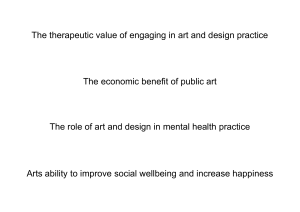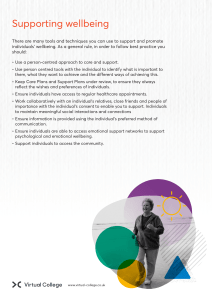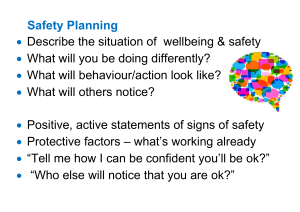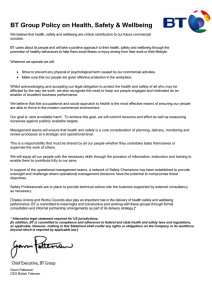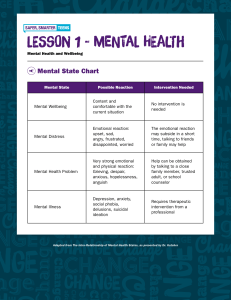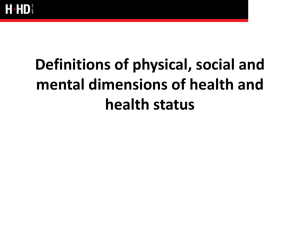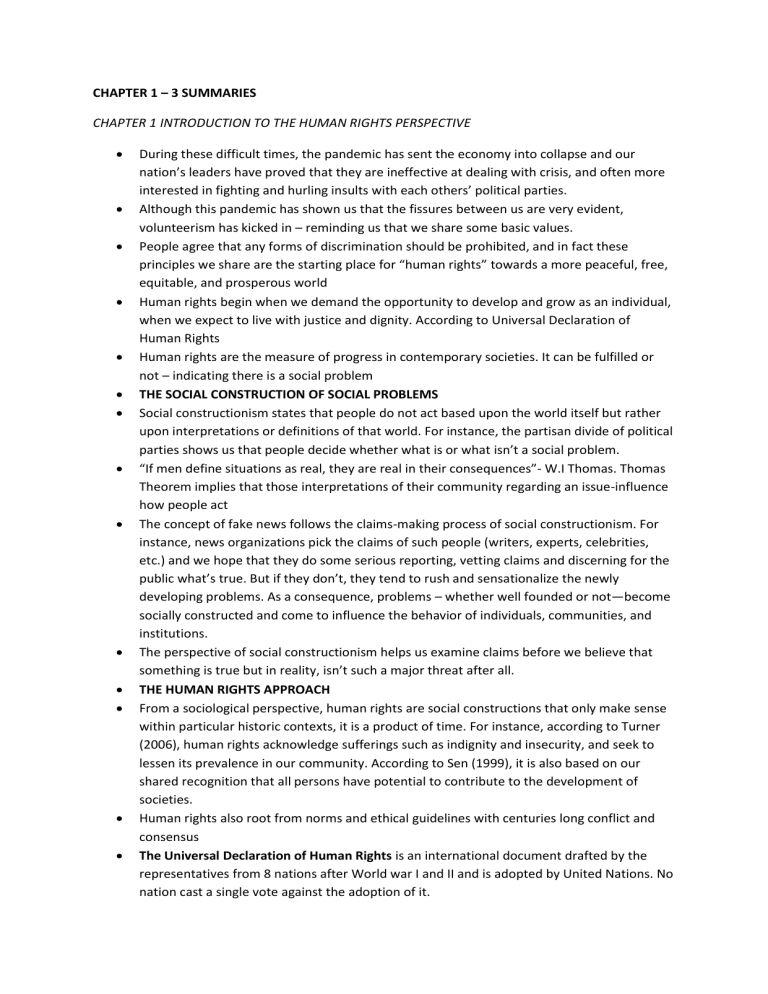
CHAPTER 1 – 3 SUMMARIES CHAPTER 1 INTRODUCTION TO THE HUMAN RIGHTS PERSPECTIVE • • • • • • • • • • • • • • During these difficult times, the pandemic has sent the economy into collapse and our nation’s leaders have proved that they are ineffective at dealing with crisis, and often more interested in fighting and hurling insults with each others’ political parties. Although this pandemic has shown us that the fissures between us are very evident, volunteerism has kicked in – reminding us that we share some basic values. People agree that any forms of discrimination should be prohibited, and in fact these principles we share are the starting place for “human rights” towards a more peaceful, free, equitable, and prosperous world Human rights begin when we demand the opportunity to develop and grow as an individual, when we expect to live with justice and dignity. According to Universal Declaration of Human Rights Human rights are the measure of progress in contemporary societies. It can be fulfilled or not – indicating there is a social problem THE SOCIAL CONSTRUCTION OF SOCIAL PROBLEMS Social constructionism states that people do not act based upon the world itself but rather upon interpretations or definitions of that world. For instance, the partisan divide of political parties shows us that people decide whether what is or what isn’t a social problem. “If men define situations as real, they are real in their consequences”- W.I Thomas. Thomas Theorem implies that those interpretations of their community regarding an issue-influence how people act The concept of fake news follows the claims-making process of social constructionism. For instance, news organizations pick the claims of such people (writers, experts, celebrities, etc.) and we hope that they do some serious reporting, vetting claims and discerning for the public what’s true. But if they don’t, they tend to rush and sensationalize the newly developing problems. As a consequence, problems – whether well founded or not—become socially constructed and come to influence the behavior of individuals, communities, and institutions. The perspective of social constructionism helps us examine claims before we believe that something is true but in reality, isn’t such a major threat after all. THE HUMAN RIGHTS APPROACH From a sociological perspective, human rights are social constructions that only make sense within particular historic contexts, it is a product of time. For instance, according to Turner (2006), human rights acknowledge sufferings such as indignity and insecurity, and seek to lessen its prevalence in our community. According to Sen (1999), it is also based on our shared recognition that all persons have potential to contribute to the development of societies. Human rights also root from norms and ethical guidelines with centuries long conflict and consensus The Universal Declaration of Human Rights is an international document drafted by the representatives from 8 nations after World war I and II and is adopted by United Nations. No nation cast a single vote against the adoption of it. • • • • • The preamble states that: Disregard and contempt for human rights have resulted in barbarous acts which have outraged the conscience of mankind, and the advent of a world in which human beings shall enjoy freedom of speech and belief and freedom from fear and want has been proclaimed as the highest aspiration of the common people. It provided a catalyst for human rights activism and advocacy. A starting place for human rights approach to social problems As mentioned, human rights are a product of time. By the time it was being drafted in 1948, some countries are still under colonialism, the lgbt were also left out, and since it was written before the environmental movement awakened people’s awareness, rights to having a pollution free environment were never considered However, Universal declaration of human rights provides no instruction on how those conflicting interpretations should be negotiated, and the viewpoint of the most powerful prevails. For instance, the use of firearms as a self-defense vs prohibition of firearms so as not to kill lives. In conclusion, the Universal Declaration of Human rights is an imperfect and incomplete document, but it was never intended to be the final decree on all rights. Rather it is only a framework. think of them in a more expansive way, as a set of normative expectations that provide an impetus for social action for people around the world. CHAPTER 2 RIGHTS TO WELLBEING AND PROPERTY IN AN UNEQUAL SOCIETY • • • • • • • • • The “first generation rights” include freedoms to live without interference in worship, speech, assembly, and voting, to be treated equally among others. While the “second generation rights” refer to these rights to dignity and wellbeing, freedom from want or in short free from poverty, however wellbeing rights of millions of persons are routinely left unfulfilled. DIGNITY AND WELLBEING COMPROMISED It is necessary to consider and account all the expenses of the family to be comfortable Poverty constitutes a serious social problem that compromises human dignity; hence it constitutes a collective failure to live up to the standards outlined by Universal Human Rights Declaration Poverty measure is still being underestimated. For instance, the poverty threshold is unable to account for the expense for smartphones, computer and the internet that many people deem essential to raise children. Supplemental poverty measure (alternative measure of poverty)- determines the threshold based upon the cost of important family expenses such as healthcare and childcare Since it is politically expedient to underestimate poverty, people might be more likely to demand changes to occur if the official measure of poverty showed greater amounts than the current measure Aside from this, even the rights to work are also unfulfilled. ACHIEVING WELLBEING FOR ALL • • • • • • • • • • • • • • • • • • The right to have a quality education falls under this, it should be affordable, Unfortunately, only wealthy nations are more capable to provide universal health coverage to their citizens, which promotes further wellbeing for all Unemployment – a feature of capitalism, but globalization and automation of work can make it worse Although there are many programs to promote wellbeing, they are simply ‘unaffordable’ CONCENTRATIONS OF INCOME AND WEALTH IN THE UNITED STATES IN A HUMAN RIGHTS CONTEXT According to Gini Index, a one way to measure inequality which ranks the distribution of family income. It states that US is on par with Philippines, Jamaica, Cameroon. Rather than looking at the income, we can assess economic inequality by looking at wealth= sum total of everything a person owns minus debts. A form of inequality that can be handed down between generations. Once inherited, it can produce more wealth. Lack of money is not the issue; it is more of a matter of priorities and power Greater equality is hindered by a worldview or ideology, as we tend to celebrate wealth while overlooking the suffering of the poor. We have codes that ban sleeping and panhandling in parks, on sidewalks and in other public places. Though it may have a benefit when it comes to protecting public health, it just makes homelessness and poverty less visible. RIGHT TO PROPERTY -A certainly fundamental right, but at the same time it cannot be absolute in contemporary societies No one’s fortune is entirely self-made. For instance, Jeff Bezos was not created by him alone, but also by the taxpayers who built and take care of the roads and internet infrastructure that help his business model possible STRIKING BALANCE BETWEEN PROPERTY OWNERSHIP AND WELLBEING TO SATISFY RIGHTS government policies tend to disproportionately favor the rights to property of the few over the wellbeing rights, as we celebrate more about material success than poverty and material deprivation We could provide an important source of revenue for programs that help provide wellbeing rights. Our current system of inheritance means that the heirs of the rich are lifted far up, while it also means that unfortunate children. However less unfortunate go without a healthy diet and pre-school “The more society is organized around the preservation of wealth for those who already have it, rather than building new wealth, the more impoverished we will all be”-Carnegie Capital gains or the income from wealth are taxed less than the tax paid by middle-class on their income taxes. Capital gain tax could be increased providing another possible means of paying the programs for the wellbeing of people. Low minimum wage has been causing the workers to protest and do an informal strike to increase their minimum wages. Increasing the pay has lots of benefits. Such as they will be able to purchase more nutritious food for their children, to take them to doctors, reducing stress levels that may lead to abuse and depression. • • In conclusion of this chapter, funding is available is there is a political will to change existing policies This balance of power between wealthy and poor can change over time toward the increased achievement of human rights, but it doesn’t just happen on its own: large numbers of people must organize and work together to make it so. CHAPTER 3 INEQUALITY AND RIGHTS TO SPEECH AND DEMOCRACY • • • • • • • • • • • • • • • • “When a majority of citizens disagree with economic elites or with organized interests, they generally lose” (Gilens and Page 2014: 576). The right to participate in free and fair elections, the right to have a meaningful voice in the government aren’t fulfilled for all citizens. For instance, numerous districts have been divided or arranged with boundaries carefully engineered by political parties to produce predetermined outcomes. There are many ways to remove the barriers to voting rather than building them up. CONTRADICTORY RIGHTS TO SPEECH AND DEMOCRACY Politicians depend on the vote of the public, so they better listen, or else they risk losing their jobs. The ides of “pluralism”: everyone’s speech is protected, and everyone’s speech is, hypothetically, equally influential, depending upon what’s being said. HOW MONEY IN POLITICS UNDERMINES DEMOCRATIC RIGHTS Most of the money spent by candidates during elections came from large donations. Although some of it is considered “dark money” in such a way to make it difficult for the public to learn who is behind these large sums Politicians, while on their seats doing legislations, allocate substantial amount of time to fundraising for the next election for an “incumbent advantage”, they are more likely to maintain their seats and fundraise more after having once won. This means that they will have less time to do important legislative work they were elected to accomplish in the first place. Also note that contribution is a form of free speech/right of speech CORRUPTION Personal corruption has been a real problem in our society. But the more pressing form of corruption is the entirely legal form of corruption that permeates today’s political environment, in which the congress gives more access and attention to wealthy contributors compared with everyone else. A more subtle than personal corruption, but is far corrosive one INSTITUTIONAL CORRUPTION OPERATES THROUGH A SYSTEM OF BOTH DEPENDENCY AND FEAR As such wealthy backers not only have the power to discontinue their financial support but can also spend money to support opposing candidates in the next election if things don’t go their way. So, they must prove themselves sympathetic to the viewpoints of the wealthy. STRIKING A BALANCE BETWEEN POLITICAL RIGHTS setting a limit on expenditure or campaign limits and disclosure of dark money
